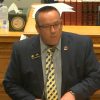As the sun set over the Capitol on Thursday evening, Colorado’s House committee on State, Veterans, and Military Affairs was working late.
They were joined by a slate of lawyers, activists and parents either strongly in support of or vehemently opposed to a house bill titled “Fundamental Family Rights in Colorado.”
The bill defined “parental rights” as autonomy in directing “the upbringing, education and care of a parent’s child” according to an online summary of the bill.
The legislation, sponsored primarily by Rep. Tim Geitner (R-Black Forest), aimed to establish parental rights as a fundamental right in Colorado subject to strict scrutiny.
It was eventually voted down by the Democrat-dominated committee.
“Families across Colorado, families from all walks of life,” Geitner said, “are expressing concern about the level at which we, as policy makers, are directing the upbringing of their children.”
In working on the bill, Geitner said he heard numerous stories of non-abusive parents being subjected to questioning, accusation and even investigation by the state.
“Perhaps even worse,” he said, “families seeking medical care for what was an accident or an illness become subjects of investigation.”
The controversial legislation was one of six bills proposed by Colorado Republicans on Thursday regarding parental rights. Some have characterized the GOP’s push to pass legislation protecting parents from charges of abuse as a cover to pass anti-LGBTQ policies.
There was plenty of opposition to the bill.
Protecting LGBTQ Youth
“It compromises the safety of our children,” Sheena Kadi, the deputy director at One Colorado – a pro-LGBTQ organization, said of the bill.
Kadi said 40% of Colorado’s homeless youth identify as LGBTQ and that 12 LGBTQ youth enter Colorado’s foster system on a daily basis.
Furthermore, she said suicide – the leading cause of death for minors in Colorado – is an extremely common amongst young members of the LGBTQ community.
“This bill would make it more difficult for LGBTQ youth to be removed from non-affirming homes,” Kadi said, which “can lead to negative physical and mental health outcomes due to remaining in those abusive homes.”
She said One Colorado has “documented reports from Adams, Arapahoe and Jefferson counties of LGBTQ youth who as recently as November of 2019 were being returned to non-affirming homes.”
She said, “The number one reason LGBTQ youth end up homeless in the state of Colorado is because they’re kicked out of homes by non-affirming parents or they run away from non-affirming homes.”
Government Treats ‘Parents as Suspects’
Still, Geitner found some support in other Republican members on his committee – including Rep. Dave Williams (R-Colorado Springs).
“There are government actors… more than willing to treat parents as suspects,” Williams said. “We do need better protections for parents and their families.”
One of those families – the Bryants, a young black military couple from Fountain, south of Colorado Springs – were separated from their infant son for almost half a year.
Their story had been published earlier that week in the Colorado Sun and was an important element of Geitner’s argument in favor of the bill.
“We had to spend 164 days without our son because of false allegations of child abuse,” Crystal Bryant said.
Their baby, Jace, had always suffered from acid reflux and esophageal issues. By the run-up to Thanksgiving 2018, the five-month-old had also recently come down with a fever and diarrhea.
Crystal and her husband Jarvis were accustomed to caring for their fragile infant, but they didn’t know he was also suffering from rickets – a condition which weakens the bones. The couple noticed their baby was unwell on several fronts and brought him to Memorial Hospital Central in Colorado Springs.
There, doctors discovered that in addition to his viral infection, Jace had ten cracked ribs, two broken wrists and a freshly-fractured femur.
The couple insisted then that they were not negligent and have since been completely exonerated by the state, but doctors from the hospital chose to call Child Protective Services.
The Bryants’ son was taken from them for almost six months. He was one of the 4,772 Coloradan children separated from their parents and living in foster care in 2019.
“I was very depressed,” Bryant said. “At the end of that, it seemed like our son had forgotten all about us.”
The couple were initially charged criminally and were facing ten to thirteen years in prison before the issue was resolved.
They are still dealing with the personal fallout, which included Jarvis being demoted and Crystal losing her certification as a nursing assistant.
Now, Bryant said she and her husband are genuinely scared to take their baby to the doctor.
“Our son was sick not too long ago,” Bryant said. She had to ask herself if it was “worth taking him to a hospital that has accused us of child abuse?”
Despite being, “as exonerated as we could be,” Bryant said she and her family are “are trying to leave [Colorado] because we have been so traumatized.”
Misplaced Priorities
Nobody in attendance on either side of the issue seemed to even remotely approve of the way the Bryants were treated.
“What happened to the Bryants should never happen to anyone,” said Karen Langsley, an attorney focused on child abuse cases.
“Having worked in the child welfare field for a very long time,” Langsley said she was very sure that “if this bill was in place it wouldn’t have done a damn thing for the Bryant family.”
She characterized the issue as less about government overreach and more about lack of training on accurately identifying physical abuse amongst medical professionals.
“What’s going to protect people is an understanding by the people in charge,” Langsley said, “that when a child presents with broken bones, it doesn’t mean the child is abused.”
Bone fractures, Langsley said, are not a surefire indicator of abuse. She said that inadequate training in identifying rickets and similar conditions amongst the state’s pediatricians has brought many good Coloradan parents a great deal of shame and grief.
Still, racial discrimination probably impacted the way the Bryants were treated – a point Geitner and other Republicans on the committee harped on in making their case.
“As a black woman, I should not be defined by the color of my skin,” Bryant said. “I should be defined as a protective parent.”




